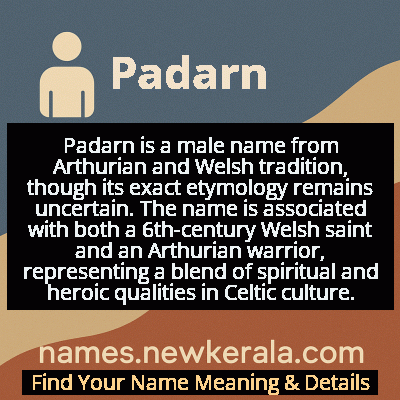Padarn Name Meaning & Details
Origin, Popularity, Numerology Analysis & Name Meaning of Padarn
Discover the origin, meaning, and cultural significance of the name PADARN. Delve into its historical roots and explore the lasting impact it has had on communities and traditions.
Name
Padarn
Gender
Male
Origin
Arthurian
Lucky Number
9
Meaning of the Name - Padarn
Padarn is a male name from Arthurian and Welsh tradition, though its exact etymology remains uncertain. The name is associated with both a 6th-century Welsh saint and an Arthurian warrior, representing a blend of spiritual and heroic qualities in Celtic culture.
Padarn - Complete Numerology Analysis
Your Numerology Number
Based on Pythagorean Numerology System
Ruling Planet
Mars
Positive Nature
Generous, passionate, energetic, and humanitarian.
Negative Traits
Impulsive, impatient, moody, and can be overly emotional.
Lucky Colours
Red, maroon, scarlet.
Lucky Days
Tuesday.
Lucky Stones
Red coral, garnet.
Harmony Numbers
1, 2, 3, 6.
Best Suited Professions
Military, sports, philanthropy, leadership roles.
What People Like About You
Courage, energy, leadership, generosity.
Famous People Named Padarn
Saint Padarn
Welsh saint and bishop
Founded Llanbadarn Fawr monastery in Ceredigion and is one of the most important early Welsh saints
Padarn Beisrudd
British chieftain
Grandfather of Cunedda, founder of the Kingdom of Gwynedd, and key figure in early Welsh genealogy
Padarn of the Red Robe
Arthurian knight
Featured in Welsh Arthurian tales as one of King Arthur's warriors and companions
Name Variations & International Equivalents
Click on blue names to explore their detailed meanings. Gray names with will be available soon.
Cultural & Historical Significance
In Arthurian tradition, Padarn appears as 'Padarn Beisrudd' (Padarn of the Red Robe), a warrior and companion of King Arthur in Welsh tales. This dual identity as both historical saint and legendary warrior creates a unique cultural bridge between the spiritual and heroic traditions of Wales. The name represents the intersection of early Welsh Christianity with the mythological Arthurian world, embodying both religious devotion and martial excellence. This combination makes Padarn a symbol of the complex cultural heritage that characterizes medieval Welsh identity, where historical figures often became incorporated into legendary narratives.
Extended Personality Analysis
Individuals named Padarn are typically associated with a distinctive blend of spiritual depth and practical strength. They often exhibit quiet determination and resilience, reflecting the saintly perseverance of their namesake combined with the warrior spirit of Arthurian tradition. These individuals tend to be principled and steadfast, capable of both contemplative reflection and decisive action when circumstances demand. The historical Padarn's role as a founder of religious institutions suggests personality traits of vision, organizational ability, and long-term thinking.
People with this name often demonstrate natural leadership qualities tempered by humility and service orientation. They value tradition and heritage while being forward-thinking, much like the historical figure who established lasting institutions. The Arthurian connection adds elements of loyalty, courage, and companionship to the personality profile. Padarn-named individuals typically possess a quiet confidence that inspires respect rather than demanding it, and they often serve as stabilizing influences in their communities or social circles. Their approach to challenges combines spiritual reflection with practical problem-solving, making them effective in both personal and professional contexts.
Modern Usage & Popularity
In contemporary naming practices, Padarn remains a rare but meaningful choice, primarily used in Wales and among families with Welsh heritage seeking to honor their cultural roots. The name has experienced occasional revival interest, particularly among parents looking for distinctive Celtic names with historical depth and Arthurian connections. While it doesn't appear on mainstream baby name charts, it maintains a steady presence in Welsh-speaking communities and among enthusiasts of Arthurian literature and Celtic history. Modern usage often reflects a conscious choice to connect with Welsh cultural identity rather than following popular naming trends, making it a name that carries significant cultural weight and personal meaning for those who choose it. The name's rarity in contemporary usage adds to its distinctive character while preserving its historical and cultural authenticity.
Symbolic & Spiritual Meanings
Symbolically, Padarn represents the powerful fusion of spiritual devotion and warrior strength, embodying the ideal balance between contemplative faith and active courage in Celtic tradition. The name carries profound connotations of foundation-building and enduring legacy, reflecting Saint Padarn's establishment of religious institutions that lasted for centuries. It symbolizes cultural continuity and the preservation of tradition across generations, serving as a living connection to Wales' early Christian and Arthurian heritage. The 'Red Robe' epithet from Arthurian tradition adds rich layers of symbolic meaning related to nobility, sacrifice, distinguished service, and the blood ties of kinship and loyalty. Overall, Padarn serves as a symbolic bridge between the earthly and spiritual realms, between historical reality and legendary imagination, between quiet devotion and public service—making it a name exceptionally rich with metaphorical depth and cultural resonance that speaks to multiple aspects of human experience and aspiration.

